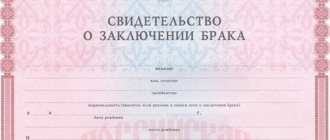Certain aspects of the transfer of property as an inheritance, as well as the acceptance of an inheritance mass, are characterized by some difficulties and contradictory situations. Cases often arise when an ex-wife acts as a claimant to the inheritance of her ex-spouse after his death. After death, a person leaves property that can be distributed exclusively among legal representatives.
In the situation under consideration, the ex-wife, from a legal point of view, is not a relative and legal recipient of the inheritance. At the same time, not everything is so simple; there are legal circumstances under which the ex-wife has the right to count on an inheritance. All the subtleties and features of this procedure will be discussed in this article.
Ex-wife's right to her husband's inheritance after divorce
The existing law enforcement practice allows us to identify several cases in which an ex-spouse has the right to receive the inheritance of her former spouse:
- A woman accepts an inheritance under a will - the testator has drawn up a will, which directly reflects the right of the ex-wife to receive part or all of her husband’s inheritance. The procedure for inheritance by will is regulated by the norms of Chapter 62 of the Civil Code of the Russian Federation.
- Inheritance by law, regulated by Chapter 63 of the Civil Code of the Russian Federation. Despite the fact that the ex-wife is not officially included in the line of heirs, there are cases when a woman can still count on property. First of all, if we are talking about inheritance through children - according to Art. 1142 of the Civil Code of the Russian Federation, the children of the testator are heirs of the first priority. Minors remain in the care of their mothers, which means the woman in this situation acts as a representative of the child and can acquire an inheritance. Secondly, if the ex-wife was a dependent of the spouse for a year or more, due to her own disability. In this case, according to Art. 1148 of the Civil Code of the Russian Federation, a woman has the right to claim inherited property on an equal basis with other heirs.
- Inheritance of a compulsory share - in accordance with Art. 1149 of the Civil Code of the Russian Federation, disabled spouses or dependents of the testator, regardless of the contents of the will, have the right to receive at least half of the share that was due to each person upon inheritance by law. The part of the inheritance in question is recognized as mandatory. Thus, even if the testator made a will, disabled dependents (including the former spouse) are entitled to an inheritance in the amount of half the share.
- The testator's property is conventionally divided into general and personal. If personal property is distributed at the discretion of the citizen, or by law, then the former spouse retains all rights to joint property acquired during the marriage. This rule is reflected in Art. 1150 Civil Code of the Russian Federation. The share of the inheritance in the situation under consideration is one half, unless a different amount was established by the marriage contract, which is reflected in Part 4 of Art. 256 of the Civil Code of the Russian Federation.
- The actual acceptance of an inheritance can be organized in the case of inheritance both by will and by law, which is reflected in Art. 1153 of the Civil Code of the Russian Federation. The ex-wife is an heir and actually accepts the inheritance if she has committed one of the following actions in accordance with Part 2 of Art. 1153 of the Civil Code of the Russian Federation: - The former spouse took possession or management of the inherited property. — Took measures to preserve the inherited property and protect it from encroachment by other persons. — The ex-wife, using her personal funds, assumed the expenses of maintaining the inheritance. — Paid the testator’s debts from personal funds or received funds due to the testator.
Official website of the Supreme Court of the Russian Federation
The unusual case was considered by the Judicial Collegium for Civil Cases of the Supreme Court of the Russian Federation. The dispute concerned the inheritance rights of a woman who called herself a common-law wife.
The situation in our case was, on the one hand, vital - the man and woman lived together for a long time - more than ten years, but the marriage was not registered. But, on the other hand, the claim was non-standard, because in domestic legislation there are neither common-law wives nor common-law husbands. Does this mean that such “unscheduled” citizens have no rights to inheritance?
The case in question was the following situation: when a man died, his legal heirs laid claim to everything he owned during his lifetime. More precisely, heirs. One of whom turned out to be the mother of the deceased man.
But then a woman appeared who decided to demand part of the inheritance for herself, declaring that she was not just the common-law wife of the deceased, she was his dependent.
For those who are not very strong in legal terms, let us clarify. According to inheritance law, minor children, parents, the spouse of the testator, plus those citizens who were his dependents have their part of the inheritance, regardless of the presence or absence of a will.
That is why the woman, who called herself a common-law wife, filed a lawsuit against two other heirs of the deceased. Her statement of claim stated that the plaintiff was the common-law wife of the deceased, lived with him as a family for more than ten years and, most importantly, was his dependent. Her pension was small compared to the pension of her common-law spouse, so it was he who paid for her life - the maintenance of the apartment, food and medicine.
Interestingly, two local courts, having considered the common-law wife’s claim, sided with her, agreeing with the woman’s demands.
The local court of first instance decided, and the appeal agreed, that the plaintiff really lived with the deceased and was dependent on him, since her pension was actually less than his.
Further and higher, the legal heirs who disagreed with this rule of division of inheritance went to the Supreme Court of the Russian Federation. The Judicial Collegium for Civil Cases of the Supreme Court studied the materials of the dispute and agreed with the arguments of the real heirs, therefore the decisions of the local courts were overturned.
According to the high court, the dispute will have to be reconsidered.
This is the logic of the reasoning of the Supreme Court of the Russian Federation.
By decision of the court of first instance, the cohabitant of the deceased citizen was recognized as his heir. The arguments of the first court were as follows: the applicant really lived with the testator for more than ten years. Accordingly, he provided for her, so she can be an heir.
Local courts did not check where the plaintiff received money for living with a small pension
Local courts stated that the common-law spouse at the time of opening the inheritance was a disabled elderly woman with a small pension, living at the expense of her partner.
Interestingly, the court of first instance even took into account the fact that the testator’s mother, when she spoke in court, called the plaintiff her son’s common-law wife.
But the Supreme Court of the Russian Federation was not convinced by these arguments. According to the Judicial Collegium for Civil Cases of the Supreme Court, their colleagues did not check where the plaintiff received money for living with such a small pension. According to the high court, local courts only limited themselves to the facts that the woman lived with the testator and her pension was significantly less than his. But this does not mean content,” the judicial panel for civil cases emphasized.
According to the Supreme Court, when raising the issue of dependency, local courts should first of all find out whether financial assistance in the last year of the testator’s life was “the plaintiff’s constant and main source of livelihood,” the Supreme Court emphasized.
In addition, according to the high court, “some circumstances of the case were not assessed by the courts.” Thus, from the case materials it is clear that the plaintiff, in her own words, “had additional income.” But these words went unheeded.
There was another important point, which for some reason the local courts did not pay attention to, although it appears in the case file. During his lifetime, the testator gave his bank cards to another person who bought food, medicine and other necessary things for him. And this man did not receive instructions from the testator to help his common-law wife.
The Supreme Court, having canceled all previous decisions, sent the case for a new trial at the first instance with instructions to consider the case taking into account its explanations.
In judicial practice in recent years, there has been only one somewhat similar case when the court examined the property rights of a common-law wife. That process did not reach the Supreme Court of the Russian Federation and was considered at the level of regional courts.
Then his adult son filed a lawsuit against the common-law wife of the deceased father. This happened in one of the southern regions of the country.
The plaintiff assured the court that his father built more than one house during his lifetime. And in the last house he built, his father lived with his common-law wife for many years. And when the man died, his legitimate son became his heir. Therefore, in addition to all the remaining goods, the son said, he also needs the house in which his father’s common-law wife currently lives. She is a stranger to the plaintiff. According to the adult son, there is no such thing in the law as a “common-law spouse.” So, a stranger lives in the house that belongs to him as an heir and needs to be evicted.
The defendant, who is also the common-law spouse, was already a very elderly person at the time the claim was considered in court, she had no relatives left, and the couple had no children together. Therefore, her eviction from the house, the defendant said, would simply mean being thrown out onto the street, since she had no other home.
It is significant that all the courts - both district and regional - unanimously sided with the elderly woman. The courts in their decision emphasized that the house is the only property that the woman has left. And since she was a housewife, her pension was minimal. And the courts left her the disputed house.
Text: Natalia Kozlova
Russian newspaper - Federal issue No. 153 (7911)
The ex-wife's right to inheritance if it was purchased during marriage
In accordance with Part 1 of Art. 34 of the RF IC, property acquired by spouses during marriage is recognized as joint property. In addition, a similar concept of common property is provided for in Part 1 of Art. 256 of the Civil Code of the Russian Federation. In accordance with Part 4 of Art. 256 of the Civil Code of the Russian Federation, in the event of the death of one of the spouses, the second has the right to common property in the amount of ½ share, unless otherwise regulated by a marriage contract, a mutual will or inheritance agreement, or a court decision. Thus, the former spouse acquires the right to receive an inheritance in the amount of half of the jointly acquired property.
The right of the former spouse to receive a joint inheritance is relevant in two cases:
- The marriage was dissolved, but the division of property was not organized. The couple did not deal with this issue for a long time. In this case, the statute of limitations is 3 years, that is, if the husband died before this period, the ex-wife can claim half of the inheritance.
- The court decision on divorce and division of property came into force after the husband died. In this case, the spouse has the right to contact a notary by writing an application for inheritance.
Rights of the husband: property received by the wife as an inheritance
The rights of the husband regarding the property that was transferred to his spouse as property by right of inheritance are determined by Article 36 of the RF IC.
According to it, each spouse is assigned the right to personal property . The second spouse has no right to claim it during the life of the first: there are no legal grounds for this. This form of ownership includes property:
- Owned separately by the spouses before the wedding day;
- Received by any of the spouses in a marriage under transactions classified as “gratuitous” (this includes gifts and inheritances).
Consequently, the husband does not have the right of ownership and disposal of the inherited property transferred to the spouse as a property.
Example: a wife inherited an apartment in the city center. At the same time, the husband has no rights to her. The spouse can dispose of the personal apartment at her own discretion: rent it out, sell it, donate it. However, the husband’s consent is not required for this. But the family can move to an apartment to live there permanently. But the registration of a spouse in it still does not give him any property rights.
An exception
There is an exception (it is reflected in Article 37 of the RF IC), according to which the wife’s inheritance can be recognized as her joint property with her husband. This is possible only if the condition is met: a large contribution was made from common funds or property, the work of the spouse, which significantly increased the value of the inheritance received by the wife.
If the inherited property has become the joint property of a married couple, then the husband is vested not only with the right to own the relevant part, but also with the right to dispose of it. At the same time, various actions with property must occur only with the consent of the second spouse.
Example: a wife inherited a dilapidated village house. The husband, using funds and his own labor, carried out major repairs, after which the value of the house doubled. From this moment on, the husband has the right to claim his part.
Joint inheritance
If a married couple appears before the testator as a single heir, then the property inherited by the couple becomes their joint property.
At the same time, the husband has both property rights and rights to dispose of this property , but only with the wife’s consent to conduct transactions.
Example: A married couple inherited an apartment together. It became their joint property. The husband has the right to dispose of it at his own discretion, subject to the fulfillment of the condition: the wife has given consent to conduct transactions with property inherited by the spouses together.
Division of the inherited property of spouses in divorce proceedings
In legal practice, there are often cases when one of the spouses, during the process of divorce, claims the property of the other spouse, which was transferred to him by inheritance rights during the marriage. Since inherited property in this case is recognized as personal property, it cannot be divided. Therefore, the husband does not have the right, during the divorce process, to divide the property of his ex-wife, transferred to her by inheritance rights during the marriage.
An exception applies if the husband carried out work or invested in property inherited by his wife, and the result of such actions was a significant increase in its value. In this case, the husband has the right to receive a certain part of his wife’s inheritance as a property upon divorce.
In the case where a married couple jointly inherited property, a separate share of it will be determined in court for each of the spouses, either in divorce proceedings.
Ex-wife's right to inheritance if there are children
Part 1 art. 64 of the RF IC regulates that parents are the legal representatives of their minor children and act in defense of their rights and interests. Thus, parents represent the interests of the child in all organizations and government bodies, including notaries and courts without special authority.
When considering the features of inheritance, you should refer to Art. 1142 of the Civil Code of the Russian Federation, according to which children are heirs of the first priority. In this case, the parent, that is, the ex-spouse, must act on behalf of the child. This does not mean that the inheritance is transferred directly to the woman and the property rights are transferred to her. Despite the fact that the ex-wife acquires part of the inheritance, the property is transferred to the child, who, upon reaching the age of 18, fully owns, uses and disposes of the objects.
Entering into inheritance on behalf of a minor child
All children of a legal spouse and former wives - natural and adopted - have an equal right to inherit their father's property. Deprivation of parental rights is not a basis for refusal of inheritance. In addition, minor children whom the father deprived in the will have the right to a mandatory share.
For minor children, all actions will be performed by their mother, if she is their legal representative. In this case, even if indirectly, the spouse receives part of the ex-husband’s inheritance.
The ex-wife's right to inheritance if the husband already has a wife and children
If the testator has a wife and children, they are heirs of the first priority, which is reflected in Art. 1142 of the Civil Code of the Russian Federation. Thus, the inheritance is distributed initially among the current wife and children. The former spouse is not deprived of the opportunity to receive part of the property by inheritance in the following situations:
- If there is a child from a former spouse who also claims to receive property first.
- Over the past year, the ex-wife has been dependent on the ex-husband in accordance with Art. 1148 of the Civil Code of the Russian Federation.
- The inheritance mass includes property acquired by former spouses during the period of cohabitation (Article 1150 of the Civil Code of the Russian Federation).
- The woman actually accepted part of the inheritance in accordance with Art. 1153 of the Civil Code of the Russian Federation.
In practice, the ex-wife acquires the right to inheritance if the testator has a current wife and children, quite rarely. The ex-wife may claim a share of the property in a situation where she is the representative of a child born to the testator.
The right to inherit property by will
Every citizen can dispose of his property in the event of death by making a will. The will must be made by a competent citizen in person.
Heirs by will
The testator, at his own discretion, has the right:
- bequeath property to any persons;
- determine the shares of heirs;
- disinherit an heir without specifying reasons;
- revoke or change a will.
The ex-wife, at the request of the testator, may be included among the heirs under the will.
Freedom of will is limited by the rules on compulsory share in inheritance (Article 1149 of the Civil Code of the Russian Federation).
Right to mandatory share
If the testator left a will and did not mention his ex-wife as an heir, but she was dependent on him, the ex-wife can claim a mandatory share in the inheritance (Article 1149 of the Civil Code of the Russian Federation).
Example: The head of a large construction company owned eight apartments of equal value, which he bequeathed to his friend. After his death, in the absence of a will, the heirs of his property would be: a pensioner mother, a son from his first marriage, a new wife and a disabled ex-wife of group 2, who was dependent on the deceased for a year and a half. Each of the heirs would receive two apartments. Since, in this case, there is a will, the son from the first marriage and the official spouse remain without inheritance, and the mother of the deceased and the ex-wife receive a mandatory share in the inheritance, which is equal to 1/2 of the share that they could receive by law, i.e. e. one apartment each. The friend, according to the will, minus the obligatory shares, inherits 6 objects.
How to inherit an ex-wife?
The ex-wife can enter into an inheritance within six months from the date of the death of the testator, which is reflected in Part 1 of Art. 1154 of the Civil Code of the Russian Federation. The sequence of inheritance of property by law is regulated by the norms of Chapter 64 of the Civil Code of the Russian Federation and consists of the following steps:
- Find out information about the notary in charge of the inheritance matter. You can contact the notary office at the place of residence of the testator to clarify all the necessary information.
- Collect a list of necessary documents, write an application for acceptance of the inheritance.
- Contact a notary with the collected documents and application. Based on the submitted papers, the specialist will open an inheritance case, identify all the heirs, collect documents and distribute property between persons.
- Pay the state fee and give the receipt to the notary. Six months after the opening of the inheritance, the ex-wife must obtain a certificate of the right to inherit.
- Based on the received certificate, registration actions should be organized with the relevant government authorities.
The result of the ex-wife entering into inheritance is the registration of ownership of a particular object. In the event that we are talking about inheritance by will, in general the sequence of actions remains the same. Only the basis for the procedure changes - not the provisions of the law, but the requirements of the will.
Composition of the inheritance after the death of the wife
Movable and immovable property and the obligations associated with it are inherited by persons specified in the will or by heirs at law. The inheritance includes the personal property of the spouse acquired by her before marriage. In addition, this also includes property received as an inheritance or as a gift, and not included in the common property of the spouses (Article 256 of the Civil Code of the Russian Federation).
The wife's share in the common property of the spouses after her death is included in the inheritance . Her husband, like other legal heirs, inherits this property in the general manner as a first-degree heir.
Required documents
In order to formalize inheritance of property to your ex-wife according to the law, you must first collect the following list of documents:
- Application for acceptance of inheritance, written in free form.
- Passport or other identification document.
- Death certificate of the testator, issued by the registry office.
- Information about the last place of registration of the testator - a certificate from the housing and communal services.
- Certificate of divorce.
- Documents confirming ownership of property, these can be technical passports, cadastral passports, certificates of registration of ownership, etc.
- Power of attorney – if a representative acts on behalf of the heir.
In the event that we are talking about inheritance by an ex-wife under a will, the list of documents will be supplemented by the will itself, otherwise the list remains the same. It is recommended to contact a notary in advance to clarify the list of documents required to open an inheritance case and receive property.
The application for acceptance of inheritance is written in free form, that is, there are no strict requirements for the document. To help you navigate this issue, you can use the attached sample.
Applications for accepting an inheritance and issuing a certificate of inheritance can be found here.
Inheritance when spouses make a joint will
Husbands and wives have been able to make a joint will since November 2015. A joint will can only include movable or immovable property that was acquired during the marriage relationship. Accordingly, all legally significant actions and decisions in relation to him must be taken with the consent of both spouses.
A special feature of this type of will is the fact that it can only be renounced during the lifetime of both spouses. This provision secures the protection of the right to freely dispose of the property mass, since the spouse is a joint owner. A will of this type can only be renounced with notarial confirmation.
In the case where the spouses have drawn up a joint will, the husband inherits the property share of the deceased spouse by legal right. At the same time, he does not have the right to dispose of this property mass, i.e. alienate it in whole or in parts. This is provided for by the imposed notarial prohibition. After the death of the surviving spouse, the entire estate will be divided by the persons designated by the will.
What should relatives do if the ex-wife of a deceased husband claims to inherit?
The relatives of the testator, in comparison with the former spouse, have a priority right to receive the inheritance when it comes to inheritance by law. This is stated in Art. Art. 1142-1145 Civil Code of the Russian Federation. If, in addition to representatives of the legal queues, the former spouse also claims to receive the inheritance, the relatives must first contact a notary. Only a specialist will determine the number of heirs claiming a share of the property, prioritize rights, and also analyze the basis on which the ex-wife claimed the right to inheritance. In this situation, the relatives of the testator need to be prepared for the fact that the shares of the inheritance may decrease due to the fact that another heir has appeared. However, each situation is individual, so it is necessary to pay attention to the arguments presented by the testator’s ex-wife.
In the event that we are talking about inheritance by a former spouse under a will, the requirements of Chapter 63 of the Civil Code of the Russian Federation are irrelevant, that is, priority is given to the will of the testator. If the document includes the ex-wife among the heirs, it is impossible to exclude her.
Division of inheritance under a marriage contract
An alternative to the legal procedure for dividing inherited property during a divorce is a concluded marriage contract. Although the practice of concluding such agreements in Russia has not yet become widely popular, they are sometimes used to protect property interests. A marriage contract has priority over the legal order and can provide for absolutely any order of division of property. Including the fact that the property inherited by the wife will completely go to the husband.
If the parties have entered into a marriage contract, no additional agreement is required.
What to do if the inheritance is registered in the name of an ex-wife?
Registration of an inheritance is possible only on the basis of a will or inheritance agreement. Thus, if the inheritance, in whole or in part, is registered in the name of the ex-wife, she has every right to take advantage of the opportunity and receive a certificate of the right to inheritance. In such a situation, the presence of children, current wife, parents and other heirs of the testator does not matter, because the testator can, at his discretion, transfer property to any person. This is evidenced by Part 1 of Art. 1119 of the Civil Code of the Russian Federation.
Standard acceptance of inheritance
The primacy of the legal powers of the spouses becomes a thing of the past in divorce. The adjective “former” deprives absolutely all legal privileges in relation to obtaining ownership of the property values of the other half.
Entering into inheritance rights in standard situations involves two ways, in relation to relationships after divorce, expressed:
- Entry into inheritance on the basis of the expressed will of the deceased - a drawn up will. This method is applicable to absolutely all persons, since it does not require confirmation of the degree of relationship. The rights to a wife's inheritance after the death of her husband during a divorce are equal to all other claimants indicated in the will drawn up on the basis of Article 1119 of the Civil Code of the Russian Federation.
- Acceptance of inherited property assets on the basis of law. Legislative norms set priorities depending on the degree of closeness of family relations, dividing relatives into eight queues, each subsequent one has the right to inherit if the previous one refuses. An exceptional feature of marriage is that it is among the applicants for inherited benefits of the first priority in the process of marriage and the absence of the ex-wife or husband among the heirs in all eight queues after the dissolution of the union.
On a formal basis, entry into inheritance after divorce and the death of a husband is “tabooed” by the letter of the law, since the breakdown of a marriage excludes the ex-wife from among relatives, and entry into inheritance rights on the basis of the law considers family ties to be a mandatory attribute.
Does the ex-spouse have the right to sue for the inheritance?
An ex-wife has the right to sue her husband’s inheritance in several situations:
- The presence of a will in which the ex-wife is defined as the only or one of the heirs in accordance with Art. 1119 of the Civil Code of the Russian Federation, as well as Part 1 of Art. 1121 Civil Code of the Russian Federation.
- The presence of a minor child born from the testator in accordance with Art. 1142 of the Civil Code of the Russian Federation.
- The ex-wife was dependent on the testator for a year or more - Art. 1148 of the Civil Code of the Russian Federation.
- The inheritance that is common is distributed, that is, which was acquired by the testator and ex-wife during the period of cohabitation - Art. 1150 Civil Code of the Russian Federation.
When a wife's inheritance is subject to division in divorce proceedings
Exceptions to the standard rule on the indivisibility of inherited property are contained in Article 37 of the Family Code.
This indicates that if during the marriage the value of the wife’s property is increased through the efforts of the husband, then he has the right to demand the division of such property in court. Let's look at similar situations using specific examples.
Situation 1.
The wife inherited an apartment from her grandmother. It was in very poor condition and required major repairs. During the period of entry into inheritance rights, the estimated cost of housing was 1.5 million rubles. During their marriage, the husband and wife jointly saved money for its repairs and finishing materials. After the work was completed, the apartment increased significantly in price, and the estimate of its market value exceeded 3 million rubles. Since the spouses jointly invested in improving the apartment from the wife’s inheritance from the family budget, it will automatically become part of the divided property. But if the wife manages to prove that it was she who made all the expenses for finishing work, then she will become the sole owner of the apartment.
Situation 2.
The wife inherited her parents' house with an area of 48 sq.m. The husband, on his own, without the involvement of builders, completed the second floor and attic. As a result, the area of the house increased to 150 sq.m., and its cost tripled. Such a house will be divided equally, but the spouse will have to prove his personal contribution to its completion.
Situation 3.
The wife inherited an abandoned plot in a gardening partnership. The husband built a private house and gazebo there and helped his wife plant trees, vegetables and fruits. Those. not only spent his own money on improving the site, but also some physical effort. As a result, he has the right to claim half of the land plot.
Situation 4.
The wife inherited a room in a communal apartment. Then she sold it and, adding funds from family savings, purchased a separate apartment. Such real estate will be shared with the spouse equally, regardless of who is the formal owner of the apartment.
Nuances
The process of inheriting property by an ex-wife is an exceptional situation rather than a general rule, so some features and nuances of the procedure should be taken into account:
- If the testator has drawn up a will, the ex-wife can be an heir only if she is reflected in this document.
- When it comes to accepting an inheritance as a representative of a joint minor child, the woman does not accept ownership rights; she only temporarily uses the objects until the child reaches adulthood.
- If the common property was not divided by the spouses after the divorce, the wife after death can claim half of the joint property. The statute of limitations in this case is 3 years and begins to run from the moment the ex-wife’s rights were violated, and not from the moment of divorce. As a rule, the specified duration is calculated from the moment of death of the former spouse.
- To obtain a certificate of ownership, the applicant must pay a state fee in the amount of 0.3% of the value of the inheritance if we are talking about a first-priority heir, as well as 0.6% if the applicant is other persons.
- After accepting the inheritance, the former spouse acquires not only the rights, but also the responsibilities associated with the property of the deceased.
- Former spouses during the period of official marriage could enter into an appropriate agreement providing for the sequence of division of property after a divorce, including in the event of the death of one of the spouses.
Spousal share in jointly acquired property
Article 1150 of the Civil Code of the Russian Federation assigns to the surviving spouse, by virtue of a will or law, the right to inherit part of the property that is the joint property of the spouses.
Spouses can divide joint property before the divorce, during the divorce process and after the divorce.
If during the life of the ex-husband the spouses did not divide the common property acquired during the marriage, then after his death the ex-wife can claim her ½ share.
Example: During a marriage, spouses bought four apartments of equal value. The ex-husband bequeathed all the property to his only daughter. After death, the ex-wife will receive two apartments as a marital share, and two apartments will go to the daughter according to the will. The former spouse does not have the right to an obligatory share in the inheritance, since at the time of the death of the testator she was able to work.







